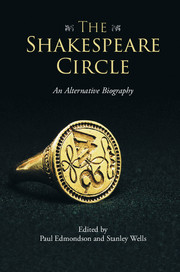Book contents
- Frontmatter
- Contents
- List of illustrations
- List of contributors
- Preface and acknowledgements
- General introduction
- Part I Family
- Part II Friends and Neighbours
- Part III Colleagues and Patrons
- 18 His fellow dramatists and early collaborators
- 19 His theatre friends: the Burbages
- 20 His fellow actors Will Kemp, Robert Armin and other members of the Lord Chamberlain's Men and the King's Men
- 21 His literary patrons
- 22 His collaborator George Wilkins
- 23 His collaborator Thomas Middleton
- 24 His collaborator John Fletcher
- 25 His editors John Heminges and Henry Condell
- Closing remarks
- Afterword
- Index
- References
21 - His literary patrons
from Part III - Colleagues and Patrons
Published online by Cambridge University Press: 05 November 2015
- Frontmatter
- Contents
- List of illustrations
- List of contributors
- Preface and acknowledgements
- General introduction
- Part I Family
- Part II Friends and Neighbours
- Part III Colleagues and Patrons
- 18 His fellow dramatists and early collaborators
- 19 His theatre friends: the Burbages
- 20 His fellow actors Will Kemp, Robert Armin and other members of the Lord Chamberlain's Men and the King's Men
- 21 His literary patrons
- 22 His collaborator George Wilkins
- 23 His collaborator Thomas Middleton
- 24 His collaborator John Fletcher
- 25 His editors John Heminges and Henry Condell
- Closing remarks
- Afterword
- Index
- References
Summary
Shakespeare's many patrons included magnates who lent their names or the names of their offices to his playing company; dedicatees of literary works; and powerful individuals for whom he performed specific services. In each case the question arises: did patronage involve personal acquaintance, or even grow into friendship?
Theatrical patronage
Without a patron, early modern stage-players risked being classified as masterless men, no better than rogues and vagabonds. While knights or minor lords might patronise players in the middle of the sixteenth century, the privilege became restricted to barons and earls during the reign of Elizabeth (1558–1603), and to members of the royal family during the reign of James (1603–25) (Chambers 1923, 4, pp. 269–71).
Shakespeare's playing company was patronised by the Lord Chamberlain from about 1594, and by King James from 1603. During the years leading up to 1594 Shakespeare can be connected, with varying degrees of certainty, to a plethora of patrons. His Titus Andronicus, according to the title-page of its first edition (1594), was performed by the players of three earls: Derby, Pembroke, and Sussex. Philip Henslowe's contemporary ‘Diary’ (Foakes 2002, pp. 21–2) reports that the same play was performed by players of the Earl of Sussex, the Lord Admiral and the Lord Chamberlain.
At the very beginning of 1594 the Earl of Derby was Ferdinando Stanley (d. 16 April 1594), styled Lord Strange until his father's death on 25 September 1593. Pembroke was William Herbert (d. 1601). Sussex was Robert Radcliffe, who succeeded at the death of his father, Henry, on 4 December 1593. The Lord Admiral was Charles Howard, Baron Howard of Effingham: his patronage of the Admiral's Men extended from 1576 to 1603. The Lord Chamberlain was Henry Carey (d. 4 July 1596), 1st Baron Hunsdon; succeeded by Sir William Brooke (d. 6 March 1597), 10th Baron Cobham; and by George Carey (d. 9 September 1603), 2nd Baron Hunsdon (ODNB 2004; Cokayne 1910–59).
- Type
- Chapter
- Information
- The Shakespeare CircleAn Alternative Biography, pp. 275 - 288Publisher: Cambridge University PressPrint publication year: 2015
References
- 1
- Cited by



